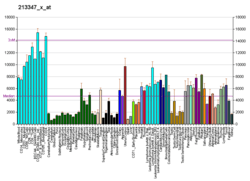RPS4X
40S ribosomal protein S4, X isoform is a protein that in humans is encoded by the RPS4X gene.[3][4][5]
Ribosomes, organelles that catalyze protein synthesis, consist of a small 40S subunit and a large 60S subunit. Together these subunits are composed of 4 RNA species and approximately 80 structurally distinct proteins. This gene encodes ribosomal protein S4, a component of the 40S subunit. Ribosomal protein S4 is the only ribosomal protein known to be encoded by more than one gene, namely this gene and ribosomal protein S4, Y-linked (RPS4Y). The 2 isoforms encoded by these genes are not identical, but are functionally equivalent. Ribosomal protein S4 belongs to the S4E family of ribosomal proteins. This gene is not subject to X-inactivation. It has been suggested that haploinsufficiency of the ribosomal protein S4 genes plays a role in Turner syndrome; however, this hypothesis is controversial. As is typical for genes encoding ribosomal proteins, there are multiple processed pseudogenes of this gene dispersed through the genome.[5]
References
- 1 2 3 GRCh38: Ensembl release 89: ENSG00000198034 - Ensembl, May 2017
- ↑ "Human PubMed Reference:".
- ↑ Watanabe M, Furuno N, Goebl M, Go M, Miyauchi K, Sekiguchi T, Basilico C, Nishimito T (Apr 1992). "Molecular cloning of the human gene, CCG2, that complements the BHK-derived temperature-sensitive cell cycle mutant tsBN63: identity of CCG2 with the human X chromosomal SCAR/RPS4X gene". J Cell Sci. 100 (1): 35–43. PMID 1795030.
- ↑ Zinn AR, Alagappan RK, Brown LG, Wool I, Page DC (Apr 1994). "Structure and function of ribosomal protein S4 genes on the human and mouse sex chromosomes". Mol Cell Biol. 14 (4): 2485–92. PMC 358616
 . PMID 8139551. doi:10.1128/mcb.14.4.2485.
. PMID 8139551. doi:10.1128/mcb.14.4.2485. - 1 2 "Entrez Gene: RPS4X ribosomal protein S4, X-linked".
Further reading
- Wool IG, Chan YL, Glück A (1996). "Structure and evolution of mammalian ribosomal proteins". Biochem. Cell Biol. 73 (11–12): 933–947. PMID 8722009. doi:10.1139/o95-101.
- Fisher EM, Beer-Romero P, Brown LG, et al. (1991). "Homologous ribosomal protein genes on the human X and Y chromosomes: escape from X inactivation and possible implications for Turner syndrome". Cell. 63 (6): 1205–1218. PMID 2124517. doi:10.1016/0092-8674(90)90416-C.
- Wiles MV, Alexander CM, Goodfellow PN (1988). "Isolation of an abundantly expressed sequence from the human X chromosome by differential screening". Somat. Cell Mol. Genet. 14 (1): 31–39. PMID 2829364. doi:10.1007/BF01535047.
- Matoba R, Okubo K, Hori N, et al. (1994). "The addition of 5'-coding information to a 3'-directed cDNA library improves analysis of gene expression". Gene. 146 (2): 199–207. PMID 8076819. doi:10.1016/0378-1119(94)90293-3.
- Maruyama K, Sugano S (1994). "Oligo-capping: a simple method to replace the cap structure of eukaryotic mRNAs with oligoribonucleotides". Gene. 138 (1–2): 171–174. PMID 8125298. doi:10.1016/0378-1119(94)90802-8.
- Watanabe M, Zinn AR, Page DC, Nishimoto T (1993). "Functional equivalence of human X- and Y-encoded isoforms of ribosomal protein S4 consistent with a role in Turner syndrome". Nat. Genet. 4 (3): 268–271. PMID 8358435. doi:10.1038/ng0793-268.
- Geerkens C, Just W, Held KR, Vogel W (1996). "Ullrich-Turner syndrome is not caused by haploinsufficiency of RPS4X". Hum. Genet. 97 (1): 39–44. PMID 8557258. doi:10.1007/bf00218830.
- Vladimirov SN, Ivanov AV, Karpova GG, et al. (1996). "Characterization of the human small-ribosomal-subunit proteins by N-terminal and internal sequencing, and mass spectrometry". Eur. J. Biochem. 239 (1): 144–149. PMID 8706699. doi:10.1111/j.1432-1033.1996.0144u.x.
- Omoe K, Endo A (1996). "Relationship between the monosomy X phenotype and Y-linked ribosomal protein S4 (Rps4) in several species of mammals: a molecular evolutionary analysis of Rps4 homologs". Genomics. 31 (1): 44–50. PMID 8808278. doi:10.1006/geno.1996.0007.
- Suzuki Y, Yoshitomo-Nakagawa K, Maruyama K, et al. (1997). "Construction and characterization of a full length-enriched and a 5'-end-enriched cDNA library". Gene. 200 (1–2): 149–156. PMID 9373149. doi:10.1016/S0378-1119(97)00411-3.
- Kenmochi N, Kawaguchi T, Rozen S, et al. (1998). "A map of 75 human ribosomal protein genes". Genome Res. 8 (5): 509–23. PMID 9582194. doi:10.1101/gr.8.5.509.
- Uechi T, Tanaka T, Kenmochi N (2001). "A complete map of the human ribosomal protein genes: assignment of 80 genes to the cytogenetic map and implications for human disorders". Genomics. 72 (3): 223–230. PMID 11401437. doi:10.1006/geno.2000.6470.
- Robinson RC, Turbedsky K, Kaiser DA, et al. (2001). "Crystal structure of Arp2/3 complex". Science. 294 (5547): 1679–1684. PMID 11721045. doi:10.1126/science.1066333.
- Andersen JS, Lyon CE, Fox AH, et al. (2002). "Directed proteomic analysis of the human nucleolus". Curr. Biol. 12 (1): 1–11. PMID 11790298. doi:10.1016/S0960-9822(01)00650-9.
- Strausberg RL, Feingold EA, Grouse LH, et al. (2003). "Generation and initial analysis of more than 15,000 full-length human and mouse cDNA sequences". Proc. Natl. Acad. Sci. U.S.A. 99 (26): 16899–16903. PMC 139241
 . PMID 12477932. doi:10.1073/pnas.242603899.
. PMID 12477932. doi:10.1073/pnas.242603899. - Agate RJ, Choe M, Arnold AP (2004). "Sex differences in structure and expression of the sex chromosome genes CHD1Z and CHD1W in zebra finches". Mol. Biol. Evol. 21 (2): 384–396. PMID 14660691. doi:10.1093/molbev/msh027.
- Ota T, Suzuki Y, Nishikawa T, et al. (2004). "Complete sequencing and characterization of 21,243 full-length human cDNAs". Nat. Genet. 36 (1): 40–45. PMID 14702039. doi:10.1038/ng1285.



